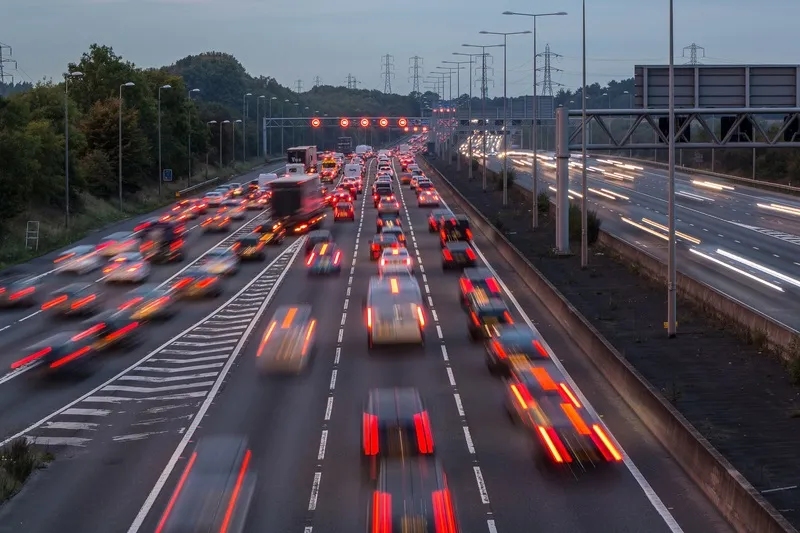A survey from toll operator Transurban finds that the Virginia Express Lanes have reduced travel times and increased lane speeds, including the main lanes.
According to data extracted from the University of Maryland’s Regional Integrated Transportation Information System, drivers in the regular lanes on the Capital Beltway and I-95 have experienced reduced travel times and faster speeds since the Express Lanes opened. As expected, drivers who take the Express Lanes experience significant travel time sav
May 15, 2015
Read time: 3 mins
A survey from toll operator 600 Transurban finds that the Virginia Express Lanes have reduced travel times and increased lane speeds, including the main lanes.
According to data extracted from the University of Maryland’s Regional Integrated Transportation Information System, drivers in the regular lanes on the Capital Beltway and I-95 have experienced reduced travel times and faster speeds since the Express Lanes opened. As expected, drivers who take the Express Lanes experience significant travel time savings when they choose to take the Lanes.
“Northern Virginia is notorious for being one of the most congested areas in the country,” said Nic Barr, vice president, Operations, Transurban. “The Express Lanes are helping to alleviate congestion and improve travel times, not just in the Express Lanes, but in the regular lanes as well. The improvements the Express Lanes have delivered to the entire corridor are a testament to why projects like the Express Lanes benefit all drivers – not just those who choose to take the Lanes.”
According to the data, which compares peak travel times for each day of week from Garrisonville Road to Franconia Road in February 2014 versus February 2015, drivers in the regular I-95 northbound lanes have experienced reduced travel times since the 95 Express Lanes opened in December 2014.
The data also reveals that drivers in the northbound regular I-95 lanes experienced faster lane speeds at peak travel times in February 2015 than they did in February 2014.
Drivers in the regular I-95 northbound lanes see the biggest improvement to travel times and lane speeds on Thursdays, saving an average of 23 minutes and travelling an average of 21 mph faster on a northbound trip from Garrisonville Road to Franconia Road.
Drivers who choose to take the 95 Express Lanes experience even more significant travel time savings. For a full-length peak southbound trip in February 2015, the maximum travel time savings realised was nearly 2.5 hours.
According to the data, which compares peak travel times for each day of week on the Capital Beltway from I-95 to Route 267 in March 2012 – before the 495 Express Lanes opened – versus March 2014, drivers in the regular northbound lanes are experiencing reduced travel times.
The data also reveals that drivers in the northbound regular Capital Beltway lanes experienced faster lane speeds at peak travel times in March 2014 than they did in March 2012.
According to data extracted from the University of Maryland’s Regional Integrated Transportation Information System, drivers in the regular lanes on the Capital Beltway and I-95 have experienced reduced travel times and faster speeds since the Express Lanes opened. As expected, drivers who take the Express Lanes experience significant travel time savings when they choose to take the Lanes.
“Northern Virginia is notorious for being one of the most congested areas in the country,” said Nic Barr, vice president, Operations, Transurban. “The Express Lanes are helping to alleviate congestion and improve travel times, not just in the Express Lanes, but in the regular lanes as well. The improvements the Express Lanes have delivered to the entire corridor are a testament to why projects like the Express Lanes benefit all drivers – not just those who choose to take the Lanes.”
According to the data, which compares peak travel times for each day of week from Garrisonville Road to Franconia Road in February 2014 versus February 2015, drivers in the regular I-95 northbound lanes have experienced reduced travel times since the 95 Express Lanes opened in December 2014.
The data also reveals that drivers in the northbound regular I-95 lanes experienced faster lane speeds at peak travel times in February 2015 than they did in February 2014.
Drivers in the regular I-95 northbound lanes see the biggest improvement to travel times and lane speeds on Thursdays, saving an average of 23 minutes and travelling an average of 21 mph faster on a northbound trip from Garrisonville Road to Franconia Road.
Drivers who choose to take the 95 Express Lanes experience even more significant travel time savings. For a full-length peak southbound trip in February 2015, the maximum travel time savings realised was nearly 2.5 hours.
According to the data, which compares peak travel times for each day of week on the Capital Beltway from I-95 to Route 267 in March 2012 – before the 495 Express Lanes opened – versus March 2014, drivers in the regular northbound lanes are experiencing reduced travel times.
The data also reveals that drivers in the northbound regular Capital Beltway lanes experienced faster lane speeds at peak travel times in March 2014 than they did in March 2012.










